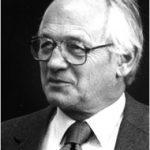 One of the most influential scholars in the field of African history recently died. Philip Curtin helped found the African Languages and Literature Department at the University of Wisconsin; the first such department in the United States according to the American Historical Association (AHA). He passed away June 4 at the age of 87.
One of the most influential scholars in the field of African history recently died. Philip Curtin helped found the African Languages and Literature Department at the University of Wisconsin; the first such department in the United States according to the American Historical Association (AHA). He passed away June 4 at the age of 87.
His book The Atlantic Slave Trade: A Census was a landmark. Prior to its publication in 1969, estimates of the number of African people stolen from their homeland ranged from a few million to 200 million. Curtin began by studying two widely used previous estimates and traced the numbers back to their origins. Then, by scrutinizing ship documents and port data, he applied quantitative methods to arrive at his own estimate of nine to ten million people, with a twenty percent margin of error. Though his work raised additional questions it provided the impetus for others who followed him to locate more and more records and refine historical accounts and estimates.
Curtin also questioned the predominately Eurocentric view of history and pioneered a new body of scholarship on Africa and other aspects of world history. I don’t believe it is overstating the case to say it was the influence of Curtin’s efforts that have resulted in people now being able to understand so much more about the history of the slave trade, the Atlantic world, the impact of the British empire, and Africa itself.
I am indebted to Philip Curtin for increasing interest in the field of African studies, and changing the way it is taught in schools, so that today much more scholarship is available than ever before. Though I did not use Curtin’s work directly in my own research for Inheriting the Trade (I relied primarily on more recent scholarship) many of the sources I did utilize site Philip Curtin’s work.
Significantly more information is now available than in 1969. The Trans-Atlantic Slave Trade Database now shows that Curtin was more accurate than many who came before him. Estimates now are that roughly twelve and a half million people left Africa in the holds of slave ships. Approximately 85% of them survived the journey through the Middle Passage to the West Indies or North and South America.
By having a more accurate account of history we are able to understand more clearly the “hows and whys” of our present conditions. Those who appreciate the importance history owe a debt of gratitude to Philip Curtin.
